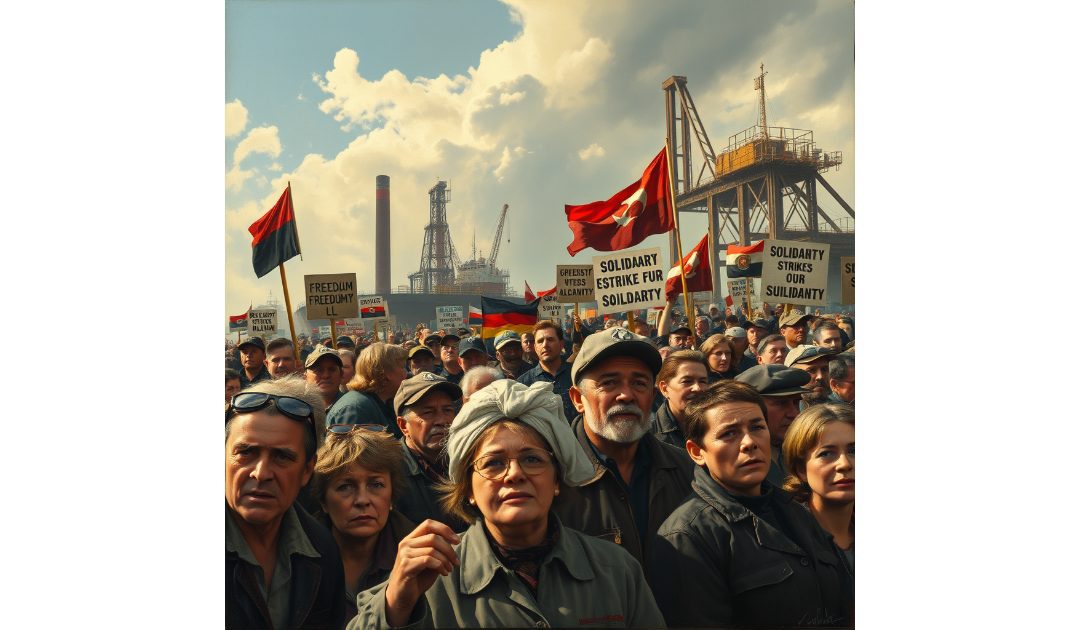On the 27th of March, 1981, the Solidarity movement in Poland staged a warning strike. Twelve million workers left their jobs for four hours. It was the beginning of the end of the Cold War.
The Solidarity movement in Poland stands as one of the pivotal forces in the waning years of the Cold War, symbolising a significant push against communist dominance in Eastern Europe. Emerging in the 1980s, this movement not only altered the political landscape of Poland but also substantially contributed to the broader geopolitical shifts that eventually led to the dissolution of the Soviet Union and the end of the Cold War.
The roots of Solidarity can be traced back to widespread dissatisfaction with Poland’s communist regime, which had been in power since the post-World War II era. Economic stagnation, political repression, and a lack of civil liberties increasingly alienated the Polish populace. In 1980, a series of strikes erupted across the nation, most notably at the Lenin Shipyard in Gdańsk, spearheaded by Lech Wałęsa and other trade unionists. These strikes marked the birth of Solidarity (Solidarność), the first non-communist trade union in a Warsaw Pact country.
Initially, Solidarity’s demands were focused on economic reform and workers’ rights, but quickly expanded to include broader calls for political changes, including freedom of speech, independent courts, and the release of political prisoners. The movement’s ability to mobilise a wide cross-section of Polish society, from intellectuals to the Catholic Church, gave it a formidable strength against the ruling party.
Despite its peaceful nature, the Polish government, backed by the Soviet Union, viewed Solidarity as a significant threat. In 1981, under pressure from Moscow, Poland’s communist leadership declared martial law to crush the movement. Thousands of Solidarity members and leaders, including Wałęsa, were arrested, and the organisation was banned. However, instead of extinguishing the flames of dissent, these actions only deepened resistance and garnered international sympathy for Solidarity.
During the martial law period, Solidarity operated underground, receiving support from various international bodies and governments. Western nations, particularly the United States, provided financial aid and equipment, recognising the movement as a frontline challenge to Soviet influence. The Catholic Church, led by Polish-born Pope John Paul II, also offered spiritual and moral support, further emboldening the movement.
The persistence of Solidarity, combined with Poland’s deteriorating economy and increasing public discontent, made it impossible for the government to maintain its hardline stance. By the late 1980s, as the Soviet Union itself began to liberalise under Mikhail Gorbachev’s policies of Glasnost and Perestroika, the Polish authorities were compelled to negotiate with Solidarity.
In 1989, the Polish government and Solidarity leaders sat down for the historic Round Table Talks, leading to the semi-free elections in June of that year, in which Solidarity won a landslide victory. This peaceful transition demonstrated to the world that change was possible without resorting to violence, inspiring similar movements across Eastern Europe.
Solidarity’s success had a domino effect. It eroded the ideological rigidity of communist regimes throughout Eastern Europe, leading to the fall of the Berlin Wall, the Velvet Revolution in Czechoslovakia, and ultimately, the collapse of communist governments across the region.
The triumph of Solidarity was not just a victory for Poland; it marked a significant turning point in the Cold War. It highlighted the vulnerabilities of Soviet-style governance and underscored the power of grassroots movements to effect systemic change. The eventual decline of Soviet influence in Eastern Europe and the subsequent dissolution of the Soviet Union were, in many respects, accelerated by the chain reaction set off by Solidarity’s success.
My service in the Royal Naval Reserve spanned the late 1980’s and early 1990’s. I remember attending “The Threat Lecture” in which we junior officers were shown slides of Soviet warships and told about their capabilities. This continued for about half an hour before the lecturer said that we didn’t really know what the threat was now. A Legacy of Spies, by John Le Carré, is a fabulous book. It’s the last book in the George Smiley series, and covers the end of the Cold War. “What was it all for?” George is asked. “Europe” was his reply. In terms of Putin and Ukraine, it seems to be all about Europe again, and we must step up to defend the legacy of those heroic Solidarity workers.

